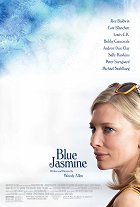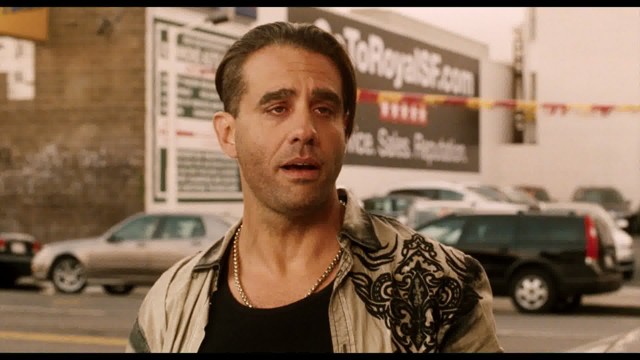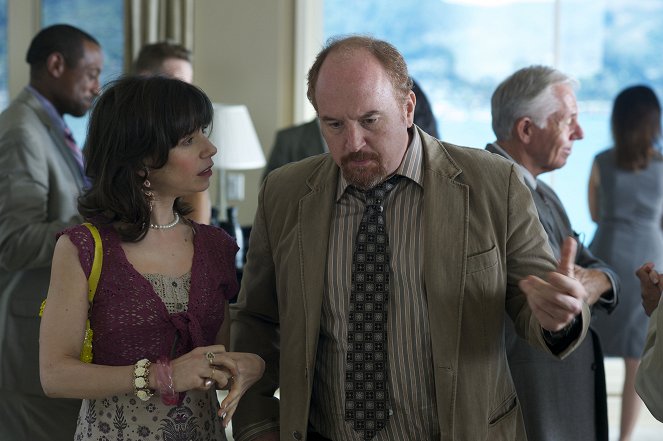Directed by:
Woody AllenScreenplay:
Woody AllenCinematography:
Javier AguirresarobeCast:
Cate Blanchett, Alec Baldwin, Sally Hawkins, Bobby Cannavale, Andrew Dice Clay, Peter Sarsgaard, Louis C.K., Alden Ehrenreich, Michael Stuhlbarg, Max Casella (more)VOD (2)
Plots(1)
Jasmine French used to be on the top of the heap as a New York socialite, but now is returning to her estranged sister in San Francisco utterly ruined. As Jasmine struggles with her haunting memories of a privileged past bearing dark realities she ignored, she tries to recover in her present. Unfortunately, it all proves a losing battle as Jasmine's narcissistic hangups and their consequences begin to overwhelm her. In doing so, her old pretensions and new deceits begin to foul up everyone's lives, especially her own. (official distributor synopsis)
(more)Videos (3)
Reviews (11)
Woody Allen gets absolute recognition mainly for the fact that a somewhat overblown comedy was expected based on the premise and the trailer, but instead, he delivers an unexpected blow to the audience. Not to say that the occasionally typical dialogues don't appear, but the rest is for the audience one of Allen's most painful screenplays. In fact, Blue Jasmine cuts deep into the lifestyle, the syndromes of today's era, and relationship deadlocks, hitting the mark. The greatest credit for that goes to Cate Blanchett, who, under the Master's guidance, as expected, grows into a goddess.
()
Like the first part of Kieslowski’s Three Colours trilogy, Allen’s tragicomic extension of A Streetcar Named Desire is in a blue mood. Blue, which for the emotionally fragile female protagonist is a symbol of tranquillity, is inserted into the film with frequent shots of the sea (which may be one of the reasons that Allen shot the film in San Francisco), and blue is also the colour of the moon in the song that Jasmine nostalgically recalls. The clear classification of the characters in Tennessee Williams’s play gives way to the destabilisation of all roles. With minor success, the two sisters seek their place among men. They are just as unclassifiable in terms of their nature as the film itself is terms of its genre as it oscillates between bitter comedy and pure tragedy. The insertion of current events through numerous flashbacks contribute to the “dual” structure of the narrative. Allen thoughtfully deals with the opposing “before” and “after” lifestyles and, more generally, the lifestyles of the rich and the poor (so the film could be credited with having a slight element of social criticism), and with the contradiction of Jasmine as passive prey and active woman/breadwinner. However, none of the positions and oppositions is permanent or impervious, so the protagonist does not cease to be dependent on others and does not definitively renounce her manners of a well-to-do lady upon arriving at her sister’s place. Jasmine’s sister once looked up to her; if Jasmine wants to survive in her new surroundings and conditions, she must now look up to her sister (both figuratively and literally, as Ginger dominates the shots on her own turf, while Jasmine is a passive beauty and a pampered queen in the world of luxury that her husband provided for her). The restrained camerawork (forget the neuroticism of Husbands and Wives; this film has a much smoother style) helps us to find our bearings in this shifting of forces and changing of roles, which are made authentic by the performances of the two lead actresses (the men are also superbly cast, but they certainly don’t play first fiddle, as they more or less there just to help move things along). Blanchett brings a theatrical loftiness to her portrayal of Jasmine, who literally cannot step out of here role, thus creating a sharp contrast with the more down-to-earth acting of the equally convincing Hawkins. Despite the film’s occasional formalistic rigidity irritating reluctance to give up on making jokes in places and the forcible insertion of themes involving crises, Blue Jasmine is, in comparison with Allen’s previous films, mostly just variously amusing puns, a decently complex study of character collapse and, after quite a long time, a Woody Allen film that the director spent enough time working on that I want to see it more than once. 75%
()
Blue Jasmine is the most depressing Woody Allen film I've seen so far. The absolute success of this film lies in Cate Blanchett's breathtaking performance and a screenplay that sent chills down my spine and stiffened my blood. Jasmine doesn't have it easy in life, in fact her sister could talk about the misery of her life. Just when there seems to be a light at the end of the tunnel, she is suddenly overwhelmed by a pile of rocks that suffocates all hope. In short, a very well acted and written film that will stick in your mind
()
Woody Allen once again mixed a slightly more serious film for us, although he certainly didn't get rid of his humor, which only shines through in some places. When you watch the film, you realize what Woody is a master of. It's the dialogues. His scripts don't have to excel with a great story, which is true in this case, but they excel in the unbelievably believable characters. Cate Blanchett proves this, not only in the final scene, when it hits you that it's really her who dominates this film. An amazingly depressing experience that will leave you unsure about what to think.
()
A fantastic social satire and a masterfully drawn probe of the age-old rivals – poverty and wealth. But Woody Allen is not so transparent and silly idealistic as to show that being poor can be cool and being rich, or the habits and attitudes of the rich, are actually superficial and bad. He goes much further and blends the two worlds in a sophisticated and very sober way, showing even the complete opposites, while eviscerating and then presenting perfectly clean real-life situations every two minutes or so. When someone makes documentaries about animals or flora, it's fine, when Woody Allen makes documentaries about people, it's even more interesting.
()



Ads